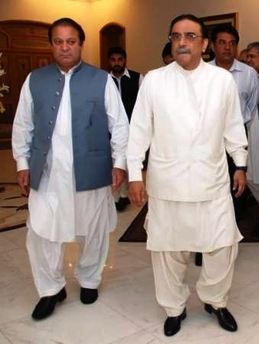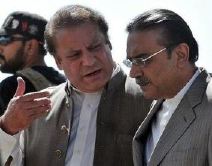 On these erudite pages, and elsewhere, there has been much ado about the fact that now the ruling coalition should split in response to the great betrayals perpetrated by Asif Ali Zardari. In classic machismo laden bravado, the honorific narratives have been urging Nawaz Sharif and his party to take the bold step and stick to their “principled” stand. What is interesting about these exhortations is the brazen rendering of political discourse in black or white terms.
On these erudite pages, and elsewhere, there has been much ado about the fact that now the ruling coalition should split in response to the great betrayals perpetrated by Asif Ali Zardari. In classic machismo laden bravado, the honorific narratives have been urging Nawaz Sharif and his party to take the bold step and stick to their “principled” stand. What is interesting about these exhortations is the brazen rendering of political discourse in black or white terms.
Many a former ambassador, the recent cohort to jump into the fray of political activism, has found a great post-retirement vocation. Once the plush tenures are over and all that could be extracted from the holy state cow, now is the time to speak the truth and condemn military dictatorships. Convenient and most opportune! This low-risk strategy is paying its dividends: a great whitewashing of all that they were a party to, and all that they let happen in front of their red-taped offices. The ex-servicemen whose record is even more dismal are even more vociferous in their advocacy for a democratic Pakistan.
Therefore, the confused citizens with a shred of historical sense are simply bewildered. Gen Chishti, the key player in toppling Zulfikar Ali Bhutto‘s government and unleashing of eleven years of mediaeval darkness, talking about resistance to army rule. Surely, the realisation took three decades of lasting damages and fissures within the body politic. Another retired Army chief, Gen Beg, is also at the forefront. His vitriole cannot hide the years when he actively sabotaged the democratic process, admitted before the Supreme Court that he had “advised” a bench not to restore Junejo‘s government; and disbursed astronomical sums of money to undermine civilian government raised through another shady character heading a dubious financial institution.
And let us not forget Air Marshal Asghar Khan, who urged Gen Zia to hang Bhutto at Kohala Bridge and that Army intervention was legitimate in national interest. His well-meaning son, the bright Omar Asghar Khan (may his soul rest in peace), joined Musharraf and heralded the dawn of a new era with the last army takeover. Inconvenient: Mea Culpa?
Since Pakistan’s inception the politicians, not the best to begin with, were, portrayed as the evil characters. The first decade of democracy 1947-58 witnessed SEVEN prime ministers with an overarching establishment fiddling and rocking the boat each time. So politicos were given a bad name and ousted in 1958 for nearly twelve years. We know well what happened during 1970-77 and eventually the 1977 coup, led from the front by Gen Chishty, depicted Bhutto as the worst thing to have happened to Pakistan. In the process, half the country was lost and institutions sabotaged even before they could take root.
The most recent decade of democratic rule 1988-99 was yet again marked by similar games of power, betrayal, military interference culminating in martial rule that is still refusing to go away. Among others, the key lesson of this decade was the willingness of the political elites to play the game, rules of which were set by power centres. They were hostage to their own limitations and the instruments of the state represented by opportunities for corruption as well as the witch-hunting organisations that ostensibly conducted accountability.
Prior to the mobilisation of the middle classes and the new components of an expanded bourgeoisie, something unique had taken place through the Charter of Democracy. This document was a Herculean achievement by the major political players, if we were to exclude the tonga parties, that is still alive and no party has backed out of it.
 This is momentous. A coalition, that too of former adversaries, will not be an easy process to manage. It will stumble, falter and swirl; and it should. Political maturity is neither gained through pompous declarations nor pious accords. It is the experience of governance and the ability of conflict-resolution and problem-solving that makes coalitions work. The Indian case is the closest to our context. In the last two decades the Indian political class has learnt the art of managing coalitions and even now this is far from a smooth ride.
This is momentous. A coalition, that too of former adversaries, will not be an easy process to manage. It will stumble, falter and swirl; and it should. Political maturity is neither gained through pompous declarations nor pious accords. It is the experience of governance and the ability of conflict-resolution and problem-solving that makes coalitions work. The Indian case is the closest to our context. In the last two decades the Indian political class has learnt the art of managing coalitions and even now this is far from a smooth ride.
The current hysteria against the villainous nature of Zardari and his real and imagined misdeeds is nothing but a desperate call for the old order – of the 1950s, 1970s and 1990s – to return in full force. Like the polarised polity of Bangladesh, where the army had to intervene in January 2007, to “save” the country from chaos?
The old order has beneficiaries: political underlings who can switch and become pegs in the power game; retired bureaucrats who can pledge loyalty for favours; journalists who can broker power and gains, and so on. This time it is difficult: who to demolish as a “security-risk” and whom to term as a born-again Jinnah. And, above all, a vigilante media, a highly charged civil society led by the lawyers cannot be appeased or tricked into these little games.
One can detect some measure of frustration, almost a panic, as to why Nawaz Sharif has not condemned Zardari and called him a chor. And why has Zardari not lashed out against the Sharifs for their inflexibility on the judges’ issue. It is a separate matter that the way a 100-days reign of this government has been judged is not even remotely akin to assessments of Musharraf‘s eight years.
Yes, the PML-N has signed off on the increase in the total number of judges to twenty-nine. Yes, it is reluctantly ready to accept PCO judges. This is pragmatism of governance as opposed to the fiery materials for political rhetoric and high posturing. We simply cannot allow the ruling parties to part their ways and demonstrate to the future authoritarian figure that politicians are incapable of governance and they “fight amongst each other.”
Political sagacity and vision require that lumberdar-behaviour, Mullahist puritanism and sloganeering must give way to a calibrated means of dispute resolution. In case the constitutional package is the only way out for the PPP, then coalition partners and advocacy groups must focus on that. I have yet to read a single informed critique of the package that is inherently transformational and holds the potential to undo mis-governance of the past. Instead, the voices that want the coalition to break away reject the package with the one-liner that it is meant to sidetrack judges’ issue. Was this impasse and tribal behaviour worth eight years of democratic struggle, the death of Benazir Bhutto and sacrifices of people who died in the lawyers’ movement? The answer, plainly, is in the negative.
Mian Nawaz Sharif is a changed man. His steadfast commitment to the renewal of the truncated democratic process has been exemplary. Zardari has already tasted the bitter pills of politics, jail, media trials and miscarriage of justice. Who would know better than them that their split will only benefit their tormentors? And if they don’t know that, then God save us all.
The coalition must not splinter. In fact, the challenges require shared governance, collective experience for many years to come. Those advocating Sharif‘s exit are serving no one’s cause.
The coalition has to stay. Let us not revive the beleaguered forces on the retreat.
–Raza also edits Pak Tea House and Lahore Nama
A version of this post also appeared the daily news here.



















































Dear Rumi Sb,
You have written, “And let us not forget Air Marshal Asghar Khan, who urged Gen Zia to hang Bhutto at Kohala Bridge and that Army intervention was legitimate in national interest.”
A little bit of historical research by you would have made you realize that Air Marshal Asghar Khan did no such thing. In a public rally, during the height of Bhutto’s political suppression, he made a statement in which he said, ‘I will hang Bhutto at Kohala Bridge.’ The motivation behind this statement was to get the fear of Bhutto out of people. It worked, as after that statement, the PNA movement gained momentom and people began demonstating against Bhutto.
Air Marshal Asghar Khan never asked Zia to take over or hang Bhutto. If you are reffering to the letter he wrote to the services officers, then I would ask you to actually read the letter. He has published it in his latest book published by the OUP and explained in detail his motivation behind writitng that letter. It was in response to a newspaper story he had read while in Kot Lakpat prison. A major had shot an innocent civilian who had showed him the ‘V’ sign. He was referring to such criminal activities of law enforcement and security officers and which is why he gave the example of the Nuremberg trials and his own. He had simply asked them to only follow lawful commands and disregard unlawful commands.
He went on to oppose Zia and his government and was in prison and under house arrest for 6 years.
I hope that you correct this error that you have made.